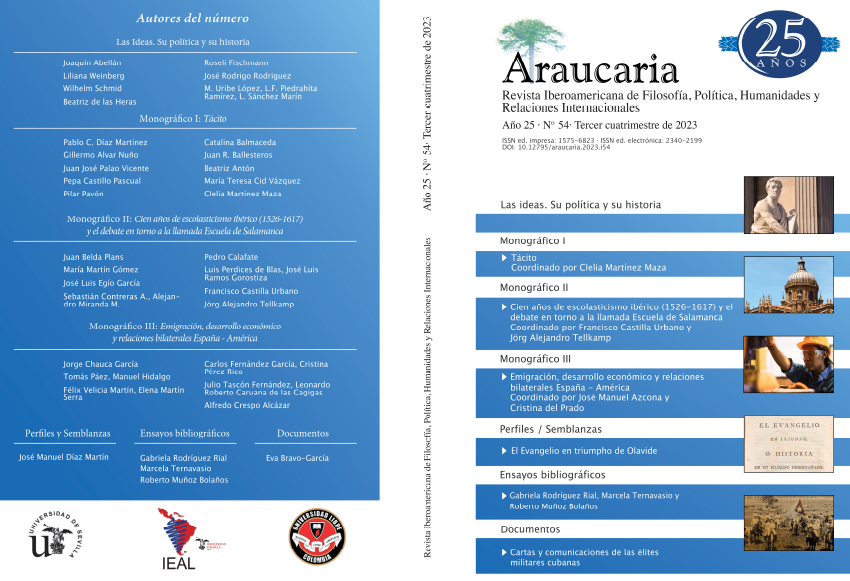Tácito y los hombres de mérito bajo el reinado de Tiberio
Tacitus and the men of merit under the reign of Tiberius
DOI:
https://doi.org/10.12795/i54.14Keywords:
Tacitus, merit, homines novi, principate, TiberiusAbstract
This work analizes the characters that Tacitus highlights as worthy of merit during the new political system of the Principate and that receive praise or approval by the historian in the first hexad of his Annals. The paper also examines the elements that constitute merit during Tiberius’ reign and that receive some kind of political compensation by the emperor.
Downloads
References
Balmaceda, C., Virtus Romana: Politics and Morality in the Roman Historians (Chapel Hill, 2017).
Bauman, R. A., Lawyers and Politics in the Early Roman Empire (Munich, 1989).
Bingham, S., The Praetorian Guard: A History of Rome’s Elite Special Forces (New York, 2013).
Birley, A., “Sejanus: his fall” [en N. Sekunda (ed.), Corolla Cosmo Rodewal, Gdansk, 2007], pp. 121-150.
Birley, A., “The Agricola” [en A. Woodman (ed.), The Cambridge Companion to Tacitus, Cambridge, 2009], pp. 47-58.
Boddington, A., “Sejanus. Whose conspiracy?”, The American Journal of Philology, 84.1 (1963), pp. 1-16.
Brunt, P., “Libertas in the Republic” [en P. Brunt, The Fall of the Roman Republic and Related Essays, Oxford, 1988], pp. 250-281.
Champlin, E., “Sejanus Augustus”, Chiron, 42 (2012), pp. 361-388.
Clarke, C., “An Island Nation: re-reading Tacitus’ Agricola”, The Journal of Roman Studies, 91 (2001), pp. 94-112.
Ducos, M., “La liberté chez Tacite. Droits de l’individu ou conduite individuelle?”, Bulletin de l’Association Guillaume Budé, 2 (1977), pp. 194-217.
Earl, D. The Political Thought of Sallust (Cambridge, 1961).
Eck, W., Caballos, A., Fernández, F., El Senadoconsulto de Gneo Pisón Padre (Sevilla, 1996).
Edo, M., “La oposición senatorial en tiempos de Augusto: el caso de Antistio Labeón”, Espacio, Tiempo y Fomra. Serie II, Historia Antigua, 33 (2020), pp. 77-96.
Guarino, A., “Labeone giurista meridionale”, Labeo, 1 (1995), pp. 109-124.
Hammond, M., “Res olim dissociabiles, Principatus ac Libertas: Liberty under the early Roman Empire”, Classical Philology, 65 (1963), pp. 93-113.
Kapust, D., “Between contumacy and obsequiousness. Tacitus on moral freedom and the historian’s task”, European Journal of Political Theory, 8 (2009), pp. 293-311.
Kapust, D., “Tacitus and political thought” [en V. Pagan (ed.), A Companion to Tacitus, Malden and Oxford, 2012], pp. 504-528.
Kraus, C., “From exempla to exemplar? Writing history around the emperor in Imperial Rome” [en J. Edmonson, S. Mason, J. Rives (eds.), Flavius Josephus and Flavian Rome, Oxford, 2005], pp. 181-200.
Laistner, M., The Greater Roman Historians (Berkeley-Los Angeles, 1947).
Levick, B., “The Senatus Consultum from Larinum”, Journal of Roman Studies, 73 (1983), pp. 97-115.
Lewis, M, The Official Priests of Rome under the Julio-Claudians: A Study of the Nobility from 44 B.C. to 68 A.D. (Rome, 1955).
Liebeschuetz, W., “Theme of liberty in the Agricola of Tacitus”, The Classical Quarterly, 16 (1) (1966), pp. 126-139.
Martin, R., Tacitus (London, 1981).
Morford, M., “How Tacitus defined liberty”, Aufstieg und Niedergang der Römische Welt II, 33.5, (1991), pp. 3420-3450.
Oakley, S., “Res olim dissociabiles: emperors, senators and liberty” [en A. Woodman (ed.), The Cambridge Companion to Tacitus, Cambridge, 2009], pp. 184-194.
Percival, J., “Tacitus and the Principate”, Greece & Rome, 27.2 (1980), pp. 119-133.
Pernice, A., Marcus Antistius Labeo: Das Römisches Privatrecht im ersten Jahrhunderte der Kaiserzeit (Halle, 1873).
Pettinger, A., “Rebuilding Romus’ senate: the Lectio Senatus of 18 BCE” [en J. Osgood, K. Morrell, K. Welch (eds.), The Alternative Augustan Age, Oxford, 2019], pp. 46-62.
Powell, L., Marcus Agrippa: Right-hand man of Caesar Augustus (Barnsley, 2015).
Reinhold, M., Marcus Agrippa: A Biography (Geneva, 1933).
Reynolds, J., Ward-Perkins, J., The Inscriptions of Roman Tripolitania (Rome, 1952).
Roddaz, J-M., Marcus Agrippa (Rome, 1984).
Rodgers, R.H.: “Curatores Aquarum”, Harvard Studies in Classical Philology, 86 (1982), pp. 71-180.
Sailor, D., “The Agricola” [en V. Pagán (ed.), A Companion to Tacitus, Malden and Oxford, 2012], pp. 23-44.
Seidl, E., “Labeos geitiges Profil”, Studi Volterra, 1 (1971), pp. 63-81.
Shotter, D., “The fall of Sejanus: two problems”, Classical Philology, 69.1 (1974), pp. 42-46.
Sinclair, P., “Rhetorical Generalizations in Annales 1-6. A Review of the problem of innuendo and Tacitus’ integrity”, Aufstieg und Niedergang der Römische Welt II, 33.4 (1991), pp. 2795-2831.
Strunk, T., History after Liberty: Tacitus on Tyrants, Sycophants, and Republicans (Ann Arbor, 2017).
Syme, R., The Roman Revolution (Oxford, 1939).
Syme, R., “Personal names in Annals I-VI”, The Journal of Roman Studies, 39.1-2 (1949), pp. 6-18.
Syme, R., “Seianus on the Aventine”, Hermes, 84.3 (1956), pp. 257-266.
Syme, R., “Missing Persons III”, Historia, 11 (1962), pp. 146-155.
Syme, R., “The Marriage of Rubellius Blandus”, The American Journal of Philology, 103.1 (1982), pp. 62-85.
Syme, R., Augustan Aristocracy (Oxford, 1986).
Van der Blom, H., Cicero’s Role Models: The Political Strategy of a Newcomer (Oxford, 2010).
Wirszubski, C., Libertas as a political idea at Rome during the late Republic and early Principate (Cambridge, 1950).
Wiseman, P., New Men in the Roman Senate (Oxford, 1971).
Woodman, A., Martin R., The Annals of Tacitus: Book 3 (Cambridge, 1996).
Woodman, A., Tacitus: Annals IV (Cambridge, 2018).
Downloads
Published
How to Cite
Issue
Section
License
Las ediciones impresa y electrónica de esta Revista son editadas por el Secretariado de Publicaciones de la Universidad de Sevilla, siendo necesario citar la procedencia en cualquier reproducción parcial o total.Salvo indicación contraria, todos los contenidos de la edición electrónica se distribuyen bajo una licencia de uso y distribución “Creative Commons Atribución-NoComercial-SinDerivar 4.0 Internacional”








